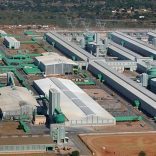Mozambique: Mining companies suspended for environmental crimes - AIM report
Mozambique: Petroleum Institute cancels tender for acquisition of seismic data

FILE - For illustration purposes only. [File photo: INP]
The National Petroleum Institute (INP), an institution overseen by the Ministry of Mineral Resources and Energy, recently announced on its official website the cancellation of the 3rd Limited Tender for the Acquisition of Seismic and Potential Data.
The communication was also forwarded to the service providers that had expressed interest in the 3rd Limited Tender for the Acquisition of Seismic and Potential Data, launched on 8 November 2024, with the justification of the need to review and improve the terms of reference.
The restricted tender, which was open for bids from November 11 to December 6, 2024, arose from the need for relevant data coverage for the areas that had been awarded in light of the different Area Concession Tenders held in Mozambique so far, and the acquisition of data would subsequently be used in the ongoing evaluation of the country’s oil potential, as well as in the next area concession tenders.
Detailing the reasons for the cancellation, the INP states that the decision aims to ensure greater efficiency and strategic alignment of the tender, with a view to “expanding the scope of the tender, in order to include areas that, although not initially contemplated, proved to be of strategic interest for expanding the coverage of potential data”.
Another reason has to do with the need to “strengthen the dissemination and promotion of the tender, with a view to attracting a more diverse group of national and international investors and clarifying the terms related to the benefits for local communities”.
The INP recently announced legislative reforms, with the central objective of creating a more favourable environment for investment and promoting more active participation by citizens and national entities throughout the entire value chain of the oil industry.
The institute’s vision is to consolidate the state’s gains, ensure concrete benefits for communities, reinforce the powers of the National Petroleum Institute and strengthen the role of the National Hydrocarbons Company.
According to the Chairman of the Board of Directors of the INP, Nazário Bangalane, the complexity and volatility of the oil industry, combined with constant geopolitical and commercial reconfigurations, as well as the growing internal challenges of socio-economic development, make it imperative to adopt measures adjusted to the new reality of the sector, forcing the review of the current legal framework.
“The legislation governing the oil sector must, in fact, evolve to become more attractive, transparent, predictable and stable, in order to respond to the demands of the global market and, at the same time, safeguard the interests of the Mozambican people,” Bangalane stressed, at the time.
The legislation to be approved should therefore also promote an environment favourable to competitiveness, encourage the participation of national and foreign investors, ensure a fair distribution of benefits, guarantee environmental protection, in line with the global energy transition agenda, and contribute to inclusive and sustainable socio-economic development.












Leave a Reply
Be the First to Comment!
You must be logged in to post a comment.
You must be logged in to post a comment.